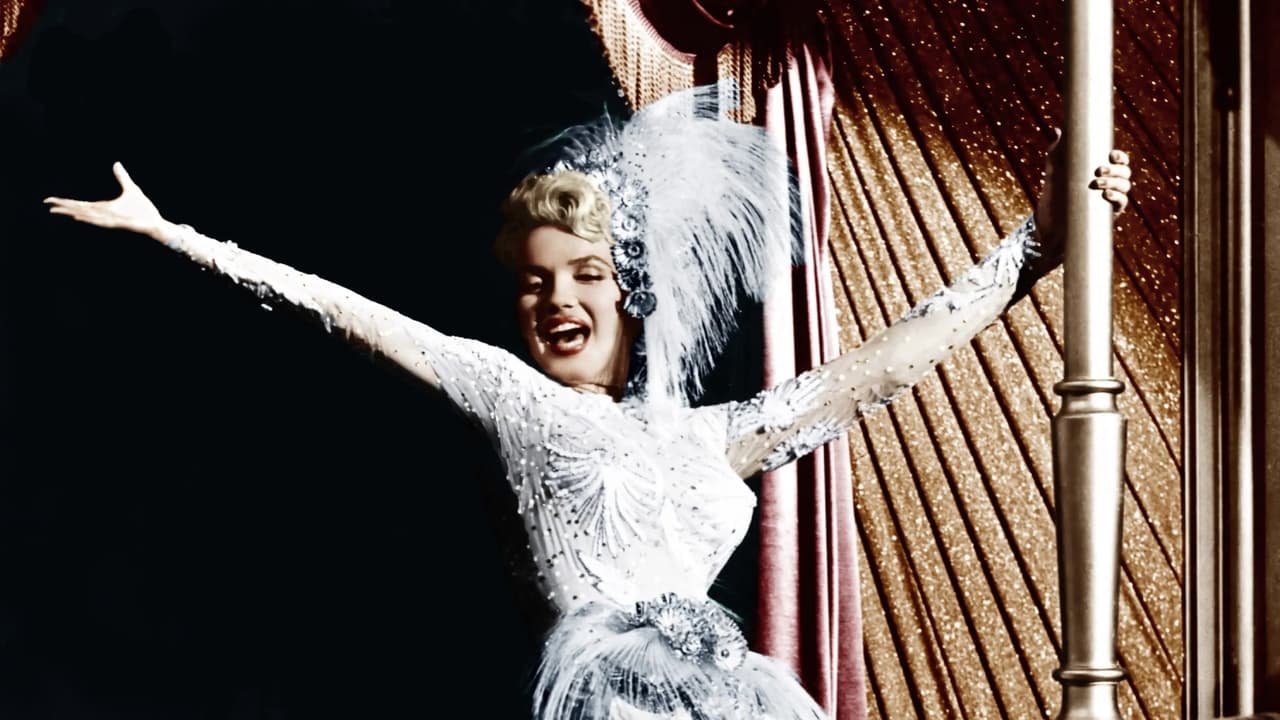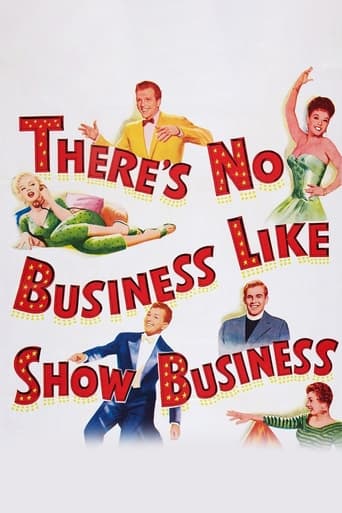

It is a performances centric movie
... View MoreAmateur movie with Big budget
... View MoreIt is interesting even when nothing much happens, which is for most of its 3-hour running time. Read full review
... View MoreOne of the best movies of the year! Incredible from the beginning to the end.
... View MoreThe Donahues are a small part of vaudeville. The husband and wife team (Ethel Merman, Dan Dailey) soon grow into The Five Donahues with their kids, Tim, Steve, and Katy. Mother is able to put them into private school and the kids are replaced by eight blondes. Things get tough after the crash. The kids grow up and rejoin the act. Tim (Donald O'Connor) is taken with hat check girl Victoria Hoffman (Marilyn Monroe) but she has her eye on ambitions of becoming a star. Steve quits the group to be a priest. Next time Tim meets Victoria, she is opening for them and she is working under the new name Vicky Parker. Her charms get him to give up hit song Heat Wave for her to perform.The first thirty minutes are a rather dull set of lavish song and dance productions with a little plot progression. The characters get a little work but nothing substantial. It's mostly Ethel Merman who saves the opening act. The movie comes to life with the arrival of Monroe. O'Connor is overmatched which is fine since it's the same for the characters. She is flamboyant, ambitious, and he's a lowly nice guy. Nice guys do really finish last. Tim comes off as petty going over the edge for a missed date. Something more substantive could have been written. Ethel Merman is class act all the way from start to finish. There is also a mismatch between Monroe's purring lounging and the active vaudevillian musicality of the Donahues. In many ways, it's the changing of the guard and it's oddly noticeable. This is a musical clashing with itself and it's awkward. It does have Monroe at her most ambitious. It's not the most pleasant but it's the deepest version of this icon. Overall, this is an old fashion vaudeville musical with a movie star stuck into its side.
... View MoreThere's No Business Like Show Business is not a great film. The story is very contrived with the mismatched chemistry between Monroe and O'Connor not ringing true at all, the script is a lot of melodramatic fluff and not much else, the film is a little overlong and Johnny Ray's performance is a failure in almost every regard. What it is though is a decent one, the music, choreography and most of the cast being what salvages it. The score is sumptuous and catchy and Irving Berlin's songs are literally like a song-book collection and a truly delightful one at that, Heat Wave and the title number coming off the best. If you love Berlin's music as I do, you'll love the music here. The choreography is lively but with grace also, Heat Wave just sizzles. Apart from Ray the cast are fine. Marilyn Monroe oozes beauty and sex appeal, with her glory moment being in Heat Wave, as mentioned already the number sizzles just as much as its title and Monroe literally smolders in it. Donald O'Connor dances wonderfully and his acting is quite touching, and the same can be said with Mitzi Gaynor, who provides the emotional moments without feeling fake at all. They are far more believable together than O'Connor and Monroe, and they're good singers too. Dan Dailey performs with much professionalism and Ethel Merman's warm personality and big brassy voice brings thrills up the spine. Walter Lang directs efficiently if more in the musical numbers than the drama ones and the film is a very well-made one, the colours just leap out of you, the costumes and sets look beautiful and the photography compliments all those in a great way. Overall, far from flawless with a few things like the story, script, length and one performance that fall flat but the things that There is No Business Like Show Business gets right are numerous and they do dazzle. 6.5/10 Bethany Cox
... View MoreWith Betty Grable slowly moving out of the film industry into live appearances and television, somebody had to take over the matriarchal stages of 20th Century Fox movies, and after her smash hit with the movie version of "Call Me Madam", Ethel Merman was just the one to do it. "There's No Business Like Show Business" is almost identical in one way or another to practically every Fox musical dating back to "George White's Scandals". It's a show business story, of course, focusing on a vaudeville family which started with mother and father (here played by Grable's former partner, Dan Dailey), and continued with their grown children (Donald O'Connor, Mitzi Gaynor, and Johnny Ray). Obviously, O'Connor and Gaynor have musical theater talents, while crooner Ray wasn't much of an actor, his character here taking a "higher calling" which for some reason upsets mama Merman.Coming into this wake of family drama with Irving Berlin music behind it is the sexpot Marilyn Monroe who wins the wrath of Merman by taking on their big number, "Heat Wave", for herself. Merman isn't too happy that other son O'Connor is obviously nuts about Monroe, but this is a 20th Century Fox musical, and nobody stays mad at nobody for long. To make this a bit different than all of the other similar musicals, 20th added Cinemascope into the mix, and packed every musical number with every available extra on the lot, especially for the lavish finale set in the now long gone Hippedrome.Musically, "There's No Business Like Show Business" can't be beat, with a blonde wigged Merman very funny while singing "A Pretty Girl is Like a Melody" and being ignored by husband Dailey, squiring around the chorus girls as she falls off a stage bench. Merman and Dailey are also ripe for a little parody from their own children who amusingly imitate them in a reprise of "When the Midnight Choo Choo Leaves for Alabam". Monroe not only heats up with "Heat Wave" but serves more electricity with "After You Get What You Want". There will probably be a mixed reaction to Gaynor and Merman in military drag when they sing the somewhat tacky "A Sailor's not a Sailor 'till a Sailor's Been Tattooed". To add to the audaciousness of it all is a huge elephantine revisit to "Alexander's Ragtime Band" which, in set as well as length, seems to go on forever.Overall, this is a nice big entertainment that misses something if not seen in its original Cinemascope presentation, and should probably be caught on the big screen if revived. When the entire company gets together for the title song finale, you'll feel relieved that the lengthy movie is coming to a close. But I guarantee, you'll be humming one of the songs before you've even removed the tape or DVD from your player and shut off the T.V.
... View MoreThere are two main types of musicals--those where the emphasis is clearly on the music and others where the music is incidental to the story. While which style you like is up to you, for me, I much prefer those with less music--where the story is predominant. So, because of my personal preference, movies like "There's No Business Like Show Business" are NOT exactly my cup of tea, so to speak.The film is about a fictional show business family, the Donohues. When the film begins, the three children are young. But then through the miracle of movie magic, soon about 15-20 years pass--and the children are now grown (and include Donald O'Connor and Mitzi Gaynor). Oddly, the parents, Dan Dailey and Ethel Merman, didn't seem to age a day. Even more noticeable is Marilyn Monroe--you see her early in the film and after all those years she looks as if she hasn't aged a day. Even if it was only 10 years--still, she looked EXACTLY the same! While the film follows the family with their ups and downs (and the third child when he decides to become a priest), all of it seems to be there just to provide a chance to sing and dance...a lot. Many of the songs are very familiar. Overall, very glossy and enjoyable if all you want is lots of singing and dancing...which I didn't. Watchable for a guy like me, but only just, as the story didn't seem strong enough to handle all the songs.
... View More